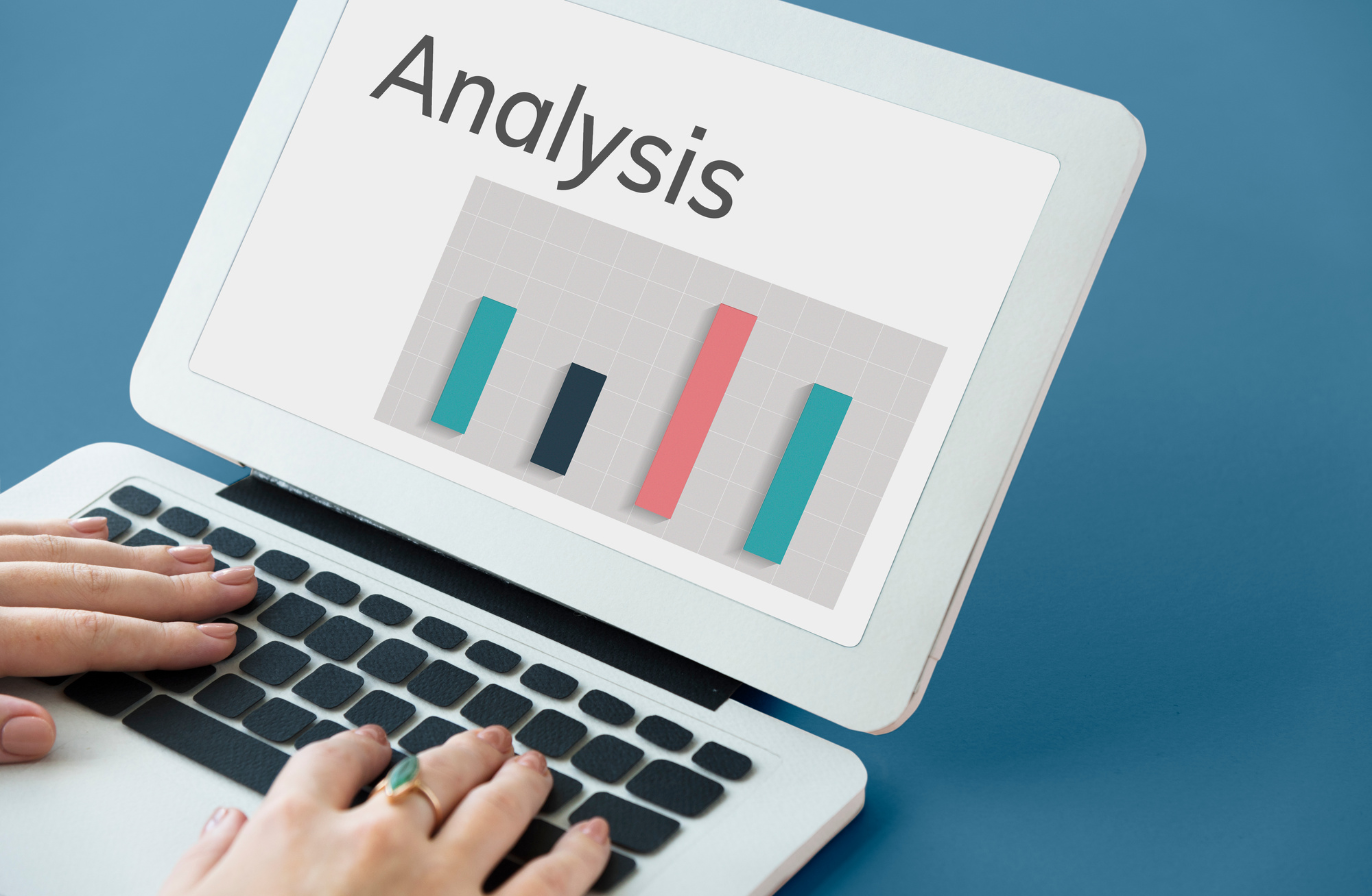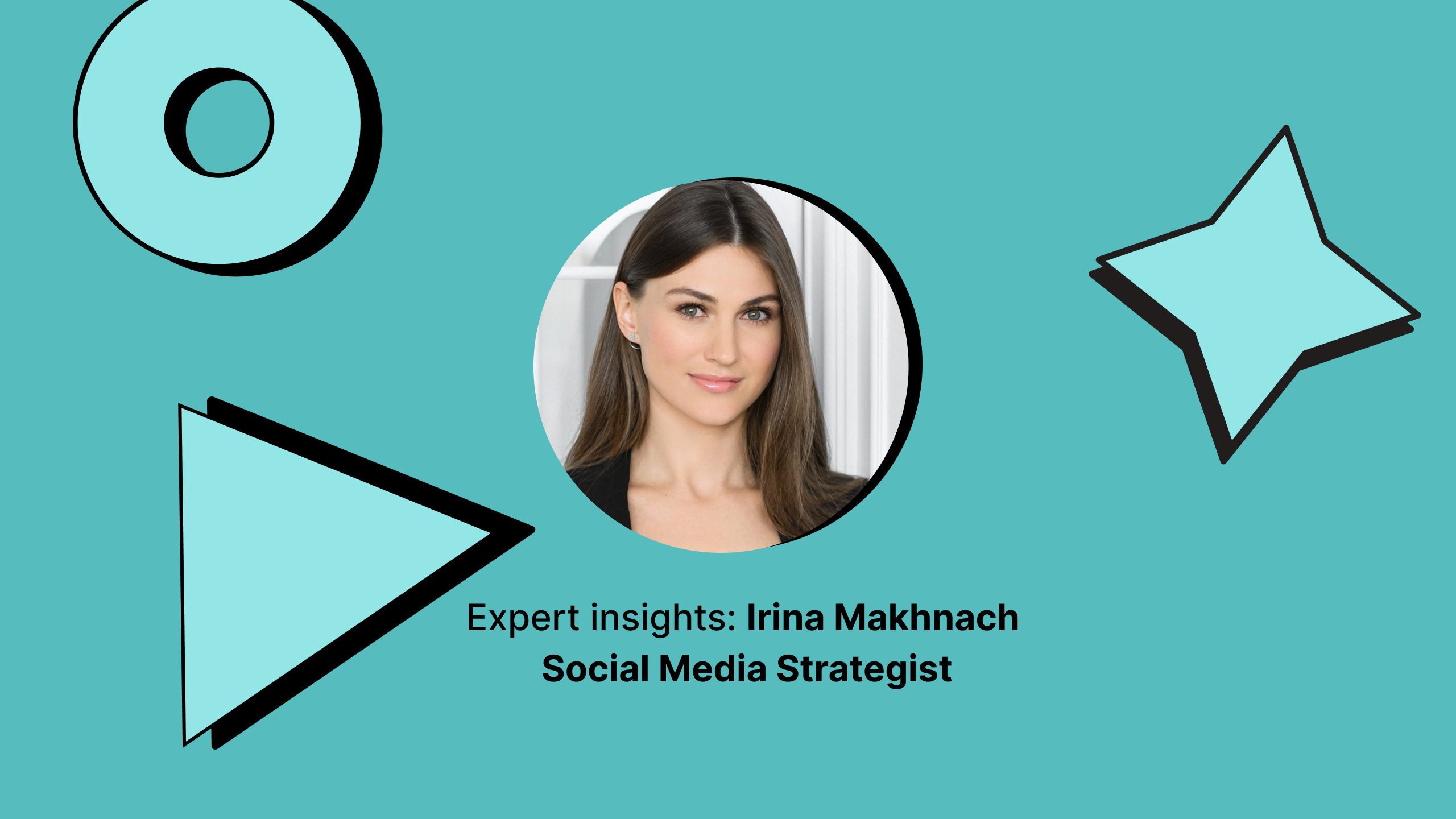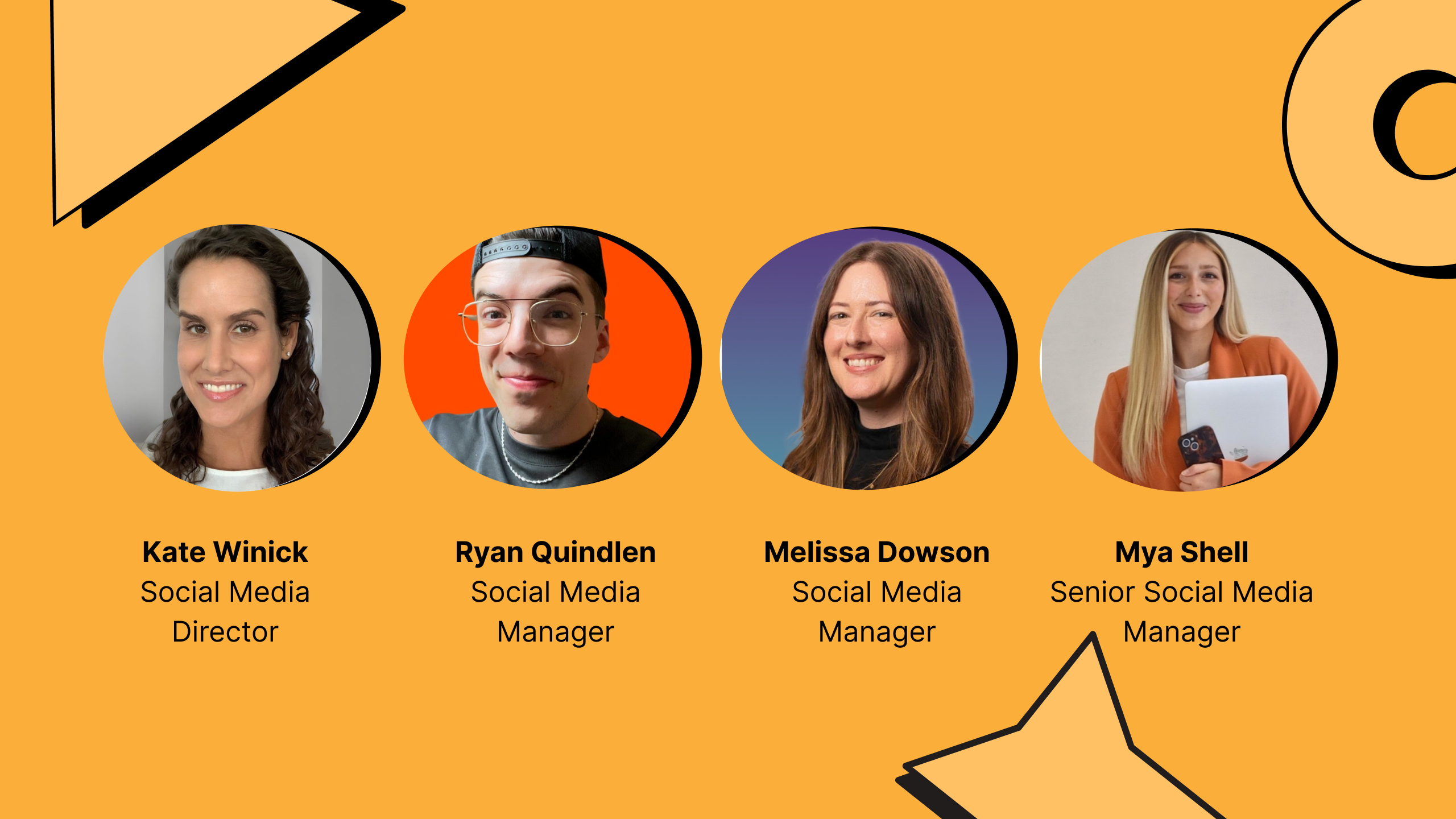AI Social Media Assistant: Your Data-Driven Partner for Smarter Marketing
Discover the power of our AI social media assistant. Streamline your content creation, optimize engagement, and elevate your brand's strategy.

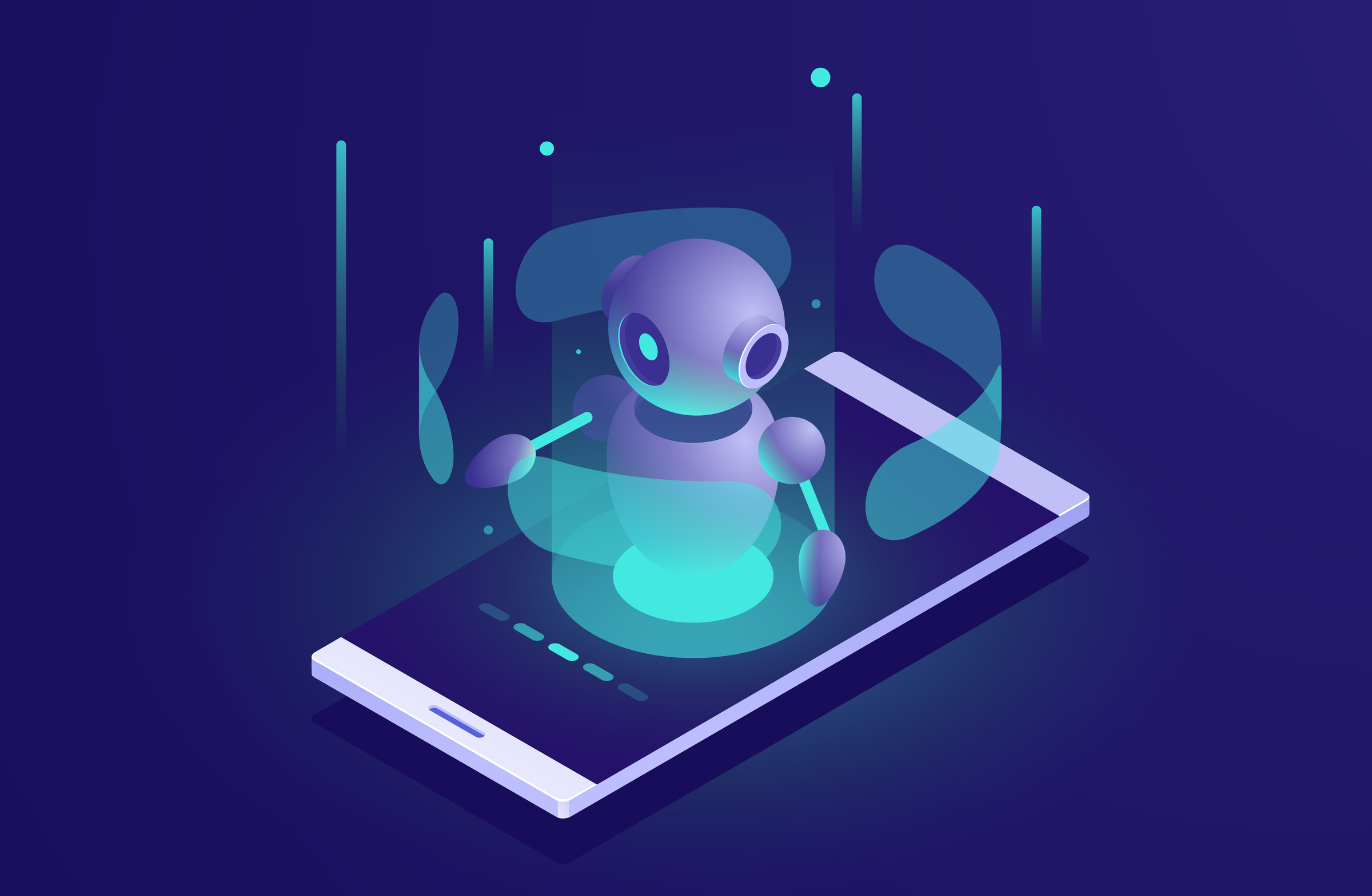
Managing social media nowadays means processing endless data streams while creating engaging content and staying ahead of trends.
An AI social media assistant transforms this challenge into an opportunity, turning overwhelming metrics into clear strategies. And speaking of this, let me guide you through key capabilities, use cases, and implementation strategies to help you leverage AI assistants as trusted marketing partners. Are your ready?
Key takeaways
- What is an AI social media assistant? An AI social media assistant is a data-driven digital co-pilot that automates tasks, analyzes performance, and delivers strategic insights to elevate your social media workflow.
- What are the key benefits of using an AI assistant? An AI assistant saves time, enhances decision-making with real-time analytics, scales with your operations, and delivers insights instantly to keep your strategy proactive.
- What are the core capabilities of an AI assistant? AI assistants combine content-generation intelligence with advanced data analysis to surface trends, interpret performance, predict outcomes, and optimize strategy.
- How to choose the right social media AI assistant for you? The right AI assistant aligns with your analytics depth, platform coverage, customization needs, accuracy requirements, and team workflow to deliver meaningful, reliable impact.
What is an AI social media assistant?
An AI social media assistant is more than just another tool in your marketing arsenal—it’s a digital partner that uses artificial intelligence to streamline, automate, and enhance almost every aspect of your social media workflow. Think of it as a smart co-pilot: it analyzes huge amounts of performance data, generates content ideas, uncovers trends, and even monitors brand sentiment—all with incredible speed and accuracy.
Instead of spending hours on manual research, routine tasks, or deciphering analytics, you rely on your AI assistant to do the heavy lifting. The result? More time for creative, strategic work—while your data-driven “assistant” works around the clock to surface insights, suggest optimizations, and take your social game to the next level.
What are the key benefits of using an AI assistant?
- Time savings and efficiency gains: Let’s face it, social media management can be overwhelming. An AI assistant automates repetitive tasks, builds comprehensive reports in seconds, and generates ready-to-use content suggestions. You’re able to focus on strategy and big-picture thinking, while the assistant manages what would otherwise take hours off your day.
- Data-driven decision making: AI assistants sift through massive amounts of engagement, content, and competitor data to uncover patterns you might easily miss. Instead of relying on gut feeling or guesswork, you make decisions and pivot strategies backed by precise, real-time analytics and smart recommendations.
- 24/7 availability and instant insights: Social media never sleeps—and neither does your AI assistant. Whether it’s flagging a spike in brand mentions at midnight or instantly surfacing best-performing posts from last quarter, AI delivers insights exactly when you need them, not just during office hours.
- Scalability for growing teams: As your social presence grows and your team expands, an AI assistant scales with you. It can handle higher data volumes, cross-platform reporting, and even support multiple users or brands at once. That means more efficiency and fewer bottlenecks—no matter how big your operation gets.
What are the core capabilities of an AI assistant?
AI assistants excel at two main areas: content creation support and data analysis. While content features help generate ideas and identify trends, the real power lies in how AI transforms complex data into strategic insights you can act on immediately.
Here's what AI social media management can actually do:
Content AI capabilities
Copy creation based on best-performing posts
Your best-performing content holds the blueprint for future success. AI assistants can analyze your top posts and generate new copy that captures what made them work: the tone, the structure, even the emotional triggers that made your audience click, comment, and share.
Visual content suggestions
Your AI assistant can analyze visual trends across your industry and suggest image styles, color palettes, and design elements that resonate with your specific audience. It tracks which visual formats generate the most engagement in your niche and alerts you to visual trends before they become oversaturated.
Trend identification and opportunity spotting
The speed at which trends rise and fall on social media requires constant monitoring that's simply not feasible for us to do manually.
AI assistants excel at pattern recognition, spotting emerging conversations and hashtags before they hit peak engagement. This gives you that crucial window to join the conversation while it's still fresh and relevant.
Content calendar planning
Forget about scheduling tools that just push posts at predetermined times. I'm talking about strategic content planning here, which involves understanding when your audience is most receptive to different content types, balancing promotional and value-driven posts, and creating thematic consistency across weeks and months.
Your AI assistant analyzes performance patterns to recommend optimal posting strategies, helping you plan content that builds momentum rather than just filling calendar slots.
Data analysis capabilities
Now, I think this is where AI social media management really proves its worth. While people excel at creativity and emotional intelligence, we simply can't process the volume of data that modern social media generates. Here's where AI transforms from a nice-to-have into a necessity.
Performance analytics interpretation
Remember when you'd stare at rows of numbers trying to figure out what they meant for your strategy? We can thankfully put those days behind us.
Take a look at how Socialinsider's AI-based key insights summary transforms raw data into actionable intelligence:
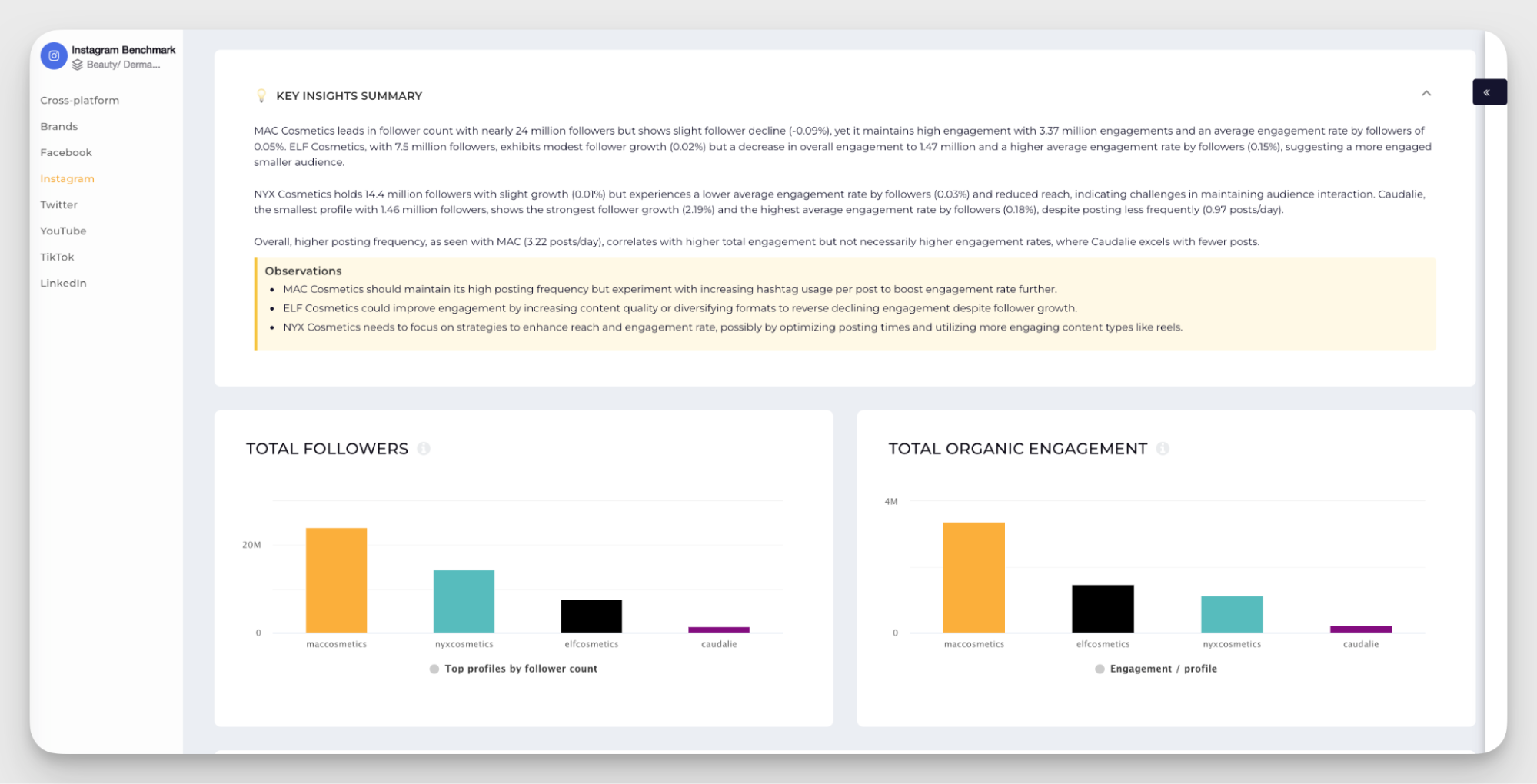
You can see how the AI doesn't just present numbers but provides context and meaning. When MAC Cosmetics shows nearly 24 million followers but maintains high engagement despite modest follower growth, the AI identifies this as a sign of strong audience retention. It highlights that ELF Cosmetics improved engagement by focusing on content quality rather than chasing follower counts, while NYX Cosmetics needs to reassess its strategy to enhance reach and engagement.
Metrics in themselves are meaningless. The real power is in understanding the relationships between them. When the AI notes that Caudalie, despite having the smallest profile, shows the strongest follower growth and highest average engagement rate, it's revealing a social media strategy lesson: smaller, engaged audiences often outperform larger, passive ones.
Competitive intelligence and benchmarking
Your competitors are generating valuable data every day, if you know how to analyze it. AI assistants excel at competitive benchmarking, tracking not just what your competitors post, but how their strategies evolve over time.
The dashboard below demonstrates this perfectly through Socialinsider's AI-based industry content pillars analysis.
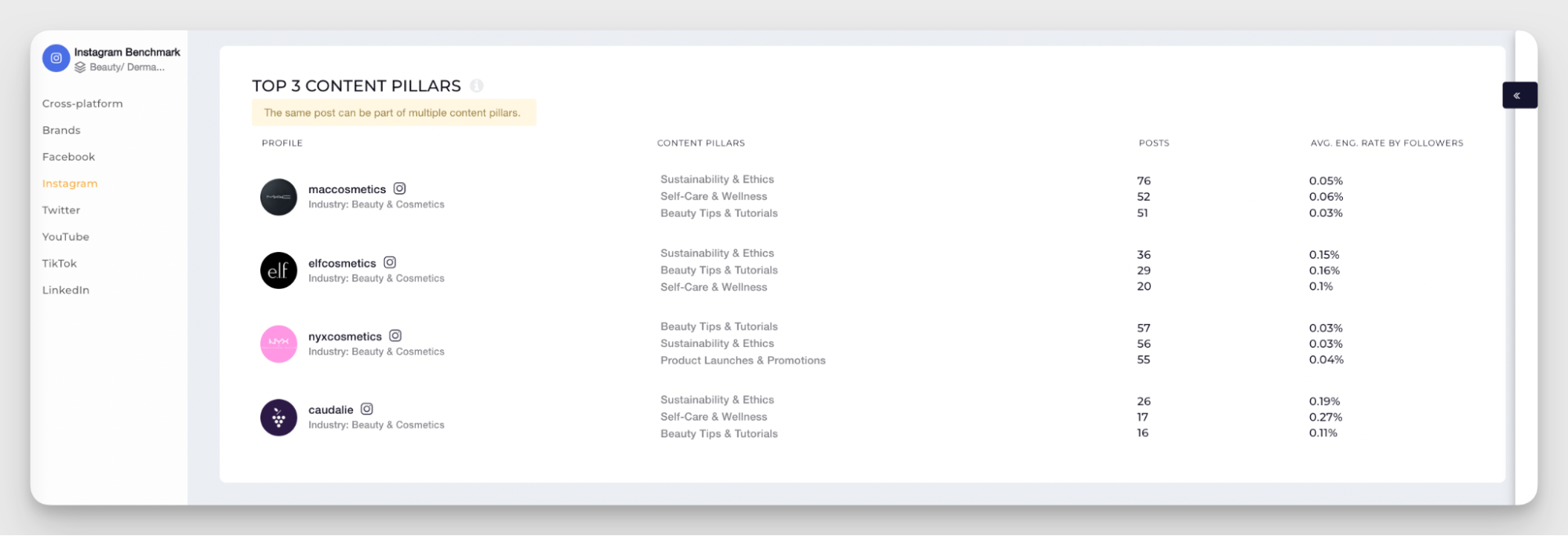
Notice how the system identifies not just which content categories competitors use, but their engagement rates by pillar. When you see MAC Cosmetics achieving slightly higher engagement with Sustainability & Ethics content compared to their Beauty & Cosmetics posts, that's a strategic insight worth investigating.
NYX Cosmetics sees their best engagement rates with Beauty Tips & Tutorials content, while Caudalie's Sustainability & Ethics pillar performs exceptionally well relative to their other content types. These patterns help you understand not just what content to create, but how to differentiate your approach from competitors while learning from their successes.
From experience, I can tell you that this kind of competitive analysis report used to take hours of manual work. Now, AI delivers these insights in real-time, allowing you to spot opportunities your competitors might be missing and adjust your strategy accordingly.
Predictive analytics for content performance
Things get really interesting for social media strategists here. By analyzing historical performance data, audience behavior patterns, and current trends, AI can tell you with increasing accuracy how different types of content will perform.
Think about what this means for your social media campaigns. Instead of testing and hoping, you're making informed decisions based on data-driven predictions. The AI learns from every post, campaign, and interaction, constantly refining its understanding of what drives engagement for your specific audience.
This predictive capability goes beyond individual posts. AI can forecast the cumulative impact of your content strategy over time, helping you understand how today's decisions affect next quarter's social media KPIs. You're essentially getting a data-backed preview of your strategy's potential outcomes, allowing you to adjust before investing resources.
PS: Socialinsider just launched an AI Assistant that excels at providing data research and interpretation, making it easier to understand not just what worked, but why it worked.
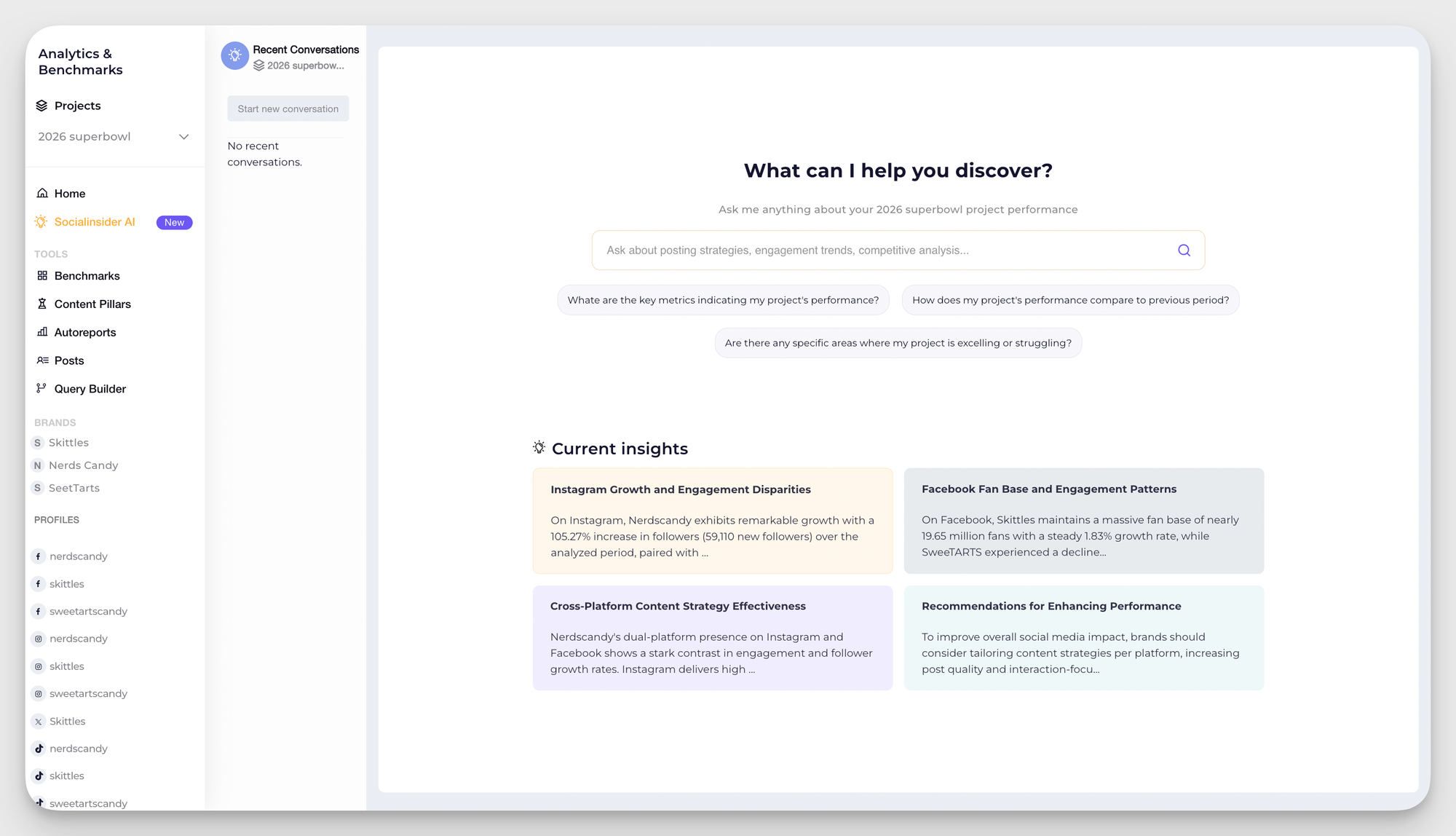
This will help users understand the patterns in successful content and apply those patterns to fresh, authentic posts. For those ready to take this further, check out these AI prompts for social media that can transform how you approach content creation.
Sentiment analysis
Numbers tell one story, but emotions might tell another, trust m eon this one. Luckily, AI assistants can transform emotions into actionable insights by analyzing the sentiment behind comments, mentions, and conversations about your brand.
This is more than simple positive/negative classification. AI can detect subtle emotional nuances, such as frustration versus disappointment, and excitement versus satisfaction. When you understand not just what people are saying but how they're feeling, you can create content that truly resonates.
More importantly, sentiment analysis helps you spot potential issues before they escalate.
Use cases where AI assistants transform social media data into actionable insights
I recently saw a social media manager on Reddit describe the frustrating experience of spending hours to manually track posts across company pages for social media reporting. One reply said, “I’ve been there. Manually tracking posts feels like a part-time job no one signed up for.”
This perfectly captures what happens when data management eats up your actual marketing time.
Every platform generates hundreds of metrics, competitors post constantly, and audience preferences are a moving target. Here's how AI deals with these issues.
The challenge of data overload in social media marketing
Managing 4-5 social media platforms means tracking thousands of data points monthly. Each platform has dozens of metrics, multiplied by your posting frequency, competitor data, and historical performance. It's no wonder that most marketers report feeling overwhelmed by social media analytics, I know.
And I also know that more data doesn't automatically mean better decisions. Without proper analysis, you might end up focusing on vanity metrics because they're easy to understand, missing the deeper patterns that actually drive results.
Turning raw data into strategic recommendations
This is one of my favorites. Because, if you ask me, this is where AI social media management proves its worth. Instead of another dashboard full of numbers, AI assistants deliver specific, actionable recommendations.
For example, rather than just showing you that engagement dropped 15% last week, an AI assistant can tell you: "Engagement decreased primarily on posts published after 6 PM. Your audience showed the highest interaction with video content between 11 AM and 2 PM. Shift your video posting schedule and test story formats for evening content."
You're basically receiving strategic guidance on three levels:
- Cross-platform pattern recognition. AI identifies patterns people miss, like discovering that Instagram Stories drive more traffic than feed posts when using specific CTAs.
- Competitive context. When AI recommends increasing video content, it's because competitor analysis shows video posts generating 3x higher engagement in your industry over the past quarter.
- Historical intelligence. AI identifies what worked during similar periods, which themes resonate consistently, and how audience preferences evolved.
Predictive modeling for campaign planning
Predictive modeling uses historical data to forecast future social media success.
Planning a product launch? Instead of hoping last year's strategy still works, AI can simulate different scenarios based on:
- Historical campaign performance
- Current engagement patterns
- Seasonal trends
- Competitor campaigns
- Algorithm changes
Here's an example. Let’s say you're planning a holiday campaign with three potential strategies. Your AI can model each approach:
- Strategy A (user-generated content): Predicts 35% engagement increase, high authenticity, best for existing audience retention.
- Strategy B (influencer-focused): Predicts 50% reach increase, new audience acquisition, higher cost per engagement.
- Strategy C (video-heavy mix): Predicts 25% steady growth, strong shareability, optimal algorithm performance.
Now you're choosing based on data-backed predictions aligned with your goals. Need rapid growth? Strategy B. Building community? Strategy A wins.
How to choose the right social media AI assistant for you?
Finding the right AI tool means matching features and capabilities to your unique needs. Here’s what to consider:
- Data analysis capabilities: Does it just surface basic stats, or can it dig into deeper analytics like engagement trends, content pillars, sentiment, or predictive performance? Look for an assistant that doesn’t just present data, but interprets it.
- Platform coverage: Check whether the AI assistant supports all the social networks you use—think Instagram, LinkedIn, Facebook, TikTok, X (Twitter), and YouTube. Full coverage ensures you get a unified, cross-platform view for smarter decisions.
- Customization and flexibility: Can you tailor reports, dashboards, and alerts to your specific KPIs and strategy? The best assistants adapt to your brand’s needs—not the other way around.
- Accuracy and reliability: Accuracy is everything. Look for an AI built on trusted data sources and transparent algorithms. It should be reliable, regularly updated, and have safeguards against misinterpretation.
- Learning curve and user experience: Your AI assistant should be easy to adopt and intuitive to use. A user-friendly interface, clear onboarding, and responsive support make the transition—and everyday workflow—so much smoother.
Questions to ask yourself before leveraging an AI assistant
Before you invest time or budget in an AI social media assistant, take a moment to reflect on your actual requirements:
What analytics depth do you need?
Are you looking for high-level summaries, or do you need detailed analysis that goes deep into audience behaviors, sentiment, and trends? If you're managing a single brand with straightforward goals, basic insights might be enough. But if you're handling multiple accounts or complex campaigns, you'll need an AI that can drill down into the nuances of your social media metrics.
How important is competitive intelligence?
Do you need to monitor just your own brand, or also keep tabs on competitors and industry trends? Make sure your assistant can handle external as well as internal analytics. The ability to benchmark your performance against competitors transforms good strategies into winning ones through competitive insights.
Do you need cross-platform insights?
If your audience is spread across multiple networks, you'll want unified, multi-channel reporting and recommendations to spot patterns others miss. An AI that analyzes platforms in isolation won't catch the cross-platform behaviors that reveal your audience's true preferences.
What's your team size and workflow?
Will the AI assistant be used by a solo marketer or an entire team? Consider features for collaboration, user roles, and workflow integration to ensure everyone benefits.
Final thoughts
The future of social media marketing is about combining human creativity and AI efficiency.
An AI social media assistant handles data heavy-lifting, pattern recognition, and predictive analysis, freeing you to focus on strategy and authentic engagement.
Start small, focus on your biggest pain points, and let AI transform how you understand and act on social media data. Experience it yourself with Socialinsider's 14-day free trial and see what intelligent analytics can do for your brand.
FAQs on social media AI assistant
How reliable are social media AI assistants?
Social media AI assistants are highly reliable when built on accurate data sources and transparent algorithms, but their effectiveness depends on continuous updates, proper context, and human oversight to validate nuanced decisions.
Analyze your competitors in seconds
Track & analyze your competitors and get top social media metrics and more!
You might also like
Improve your social media strategy with Socialinsider!
Use in-depth data to measure your social accounts’ performance, analyze competitors, and gain insights to improve your strategy.

